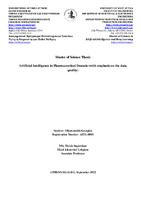| dc.contributor.advisor | Leligou, Helen C. (Nelly) | |
| dc.contributor.author | Οικονομίδης, Γεώργιος | |
| dc.date.accessioned | 2022-10-05T08:47:12Z | |
| dc.date.available | 2022-10-05T08:47:12Z | |
| dc.date.issued | 2022-09-19 | |
| dc.identifier.uri | https://polynoe.lib.uniwa.gr/xmlui/handle/11400/2980 | |
| dc.identifier.uri | http://dx.doi.org/10.26265/polynoe-2820 | |
| dc.description.abstract | Over the past decades, computer science has been widely developed. From speech recognition to reconstructing brain circuits to even natural language understanding, one can easily claim that Machine Learning and Deep Learning have become part of everyday life. They have been used in most of the industries and the pharmaceutical one is no exception. During the recent years, data integrity has been an important part of the pharmaceutical industry. It is mandatory to ensure the quality and the safety a drug has from the start of its production till it reaches the customer. In order to achieve this, the American Food and Drug Administration (FDA) introduced the ALCOA principles as guidelines for every pharmaceutical company. The ALCOA acronym stands for Attributable, Legible, Contemporaneous, Original, and Accurate which are values derived from the pharmaceutical industry data collected during the manufacturing process and which ensure the integrity of the data. SPuMoNI is a European funded research project that explores the authenticity of such data using innovative scientific approaches. This thesis presents, an experimental attempt to predict the ALCOA values while using the raw sensor data as an input. To achieve the best regression result, three Deep Learning Recurrent Neural Networks have been used. Long Short-Term Memory, Bidirectional Long-Short Term Memory and Gated Recurrent Unit. More specifically, there are two ALCOA values that are being examined in this thesis, Legible and Accurate. The language used for programming the algorithm was Python through Google Collaboratory and the library imported for the deep learning methods was Google’s TensorFlow. Through the research conducted, it was shown that the prediction’s accuracy of the ALCOA principles Legible and Accurate was below 80% which drives us to research a) which additional parameters need to be taken into account and b) which algorithms such as a Transformer Neural Network could lead to accuracy improvements. | el |
| dc.format.extent | 54 | el |
| dc.language.iso | en | el |
| dc.publisher | Πανεπιστήμιο Δυτικής Αττικής | el |
| dc.rights | Αναφορά Δημιουργού - Μη Εμπορική Χρήση - Παρόμοια Διανομή 4.0 Διεθνές | * |
| dc.rights | Αναφορά Δημιουργού - Μη Εμπορική Χρήση - Παρόμοια Διανομή 4.0 Διεθνές | * |
| dc.rights.uri | http://creativecommons.org/licenses/by-nc-sa/4.0/ | * |
| dc.subject | ALCOA | el |
| dc.subject | Deep learning | el |
| dc.subject | Pharmaceutical industry | el |
| dc.subject | Data integrity | el |
| dc.subject | Accurate | el |
| dc.subject | Legible | el |
| dc.subject | Βαθιά μάθηση | el |
| dc.subject | Ακεραιότητα δεδομένων | el |
| dc.subject | Φαρμακευτική βιομηχανία | el |
| dc.title | Artificial intelligence in pharmaceutical domain (with emphasis on the data quality) | el |
| dc.title.alternative | Η εφαρμογή της τεχνητής νοημοσύνης στο φαρμακευτικό τομέα (με έμφαση στην ποιότητα των δεδομένων) | el |
| dc.type | Μεταπτυχιακή διπλωματική εργασία | el |
| dc.contributor.committee | Karageorgos, Anthony | |
| dc.contributor.committee | Lallas, Efthymios | |
| dc.contributor.faculty | Σχολή Μηχανικών | el |
| dc.contributor.department | Τμήμα Ηλεκτρολόγων και Ηλεκτρονικών Μηχανικών | el |
| dc.contributor.department | Τμήμα Μηχανικών Βιομηχανικής Σχεδίασης και Παραγωγής | el |
| dc.contributor.master | Τεχνητή Νοημοσύνη και Βαθιά Μάθηση | el |
| dc.description.abstracttranslated | Από τα μέσα του 21ου αιώνα έως και σήμερα, η επιστήμη των υπολογιστών έχει αναπτυχθεί ευρέως. Από την αναγνώριση ομιλίας έως την ανακατασκευή εγκεφαλικών κυκλωμάτων μέχρι και την κατανόηση της φυσικής γλώσσας, μπορεί κανείς εύκολα να ισχυριστεί ότι η Μηχανική Μάθηση και η Βαθιά Μάθηση έχουν γίνει μέρος της καθημερινής ζωής κάθε ανθρώπου Χρησιμοποιούνται σε πληθώρα βιομηχανιών και η φαρμακοβιομηχανία δεν αποτελεί εξαίρεση. Τα τελευταία χρόνια, η ακεραιότητα των δεδομένων αποτελεί σημαντικό μέρος του φαρμακευτικού κλάδου. Είναι απαραίτητο να διασφαλίζεται η ποιότητα και η ασφάλεια που έχει ένα φάρμακο από την έναρξη της παραγωγής του μέχρι να φτάσει στον πελάτη. Για να επιτευχθεί αυτό, η Αμερικάνικη Υπηρεσία Τροφίμων και Φαρμάκων εισήγαγε τις αρχές ALCOA ως κατευθυντήριες γραμμές για κάθε φαρμακευτική εταιρεία. Το ακρωνύμιο ALCOA σημαίνει Attributable, Legible, Contemporaneous, Original και Accurate και χαρακτηρίζει τιμές που εξάγονται από τα δεδομένα (τα οποία συλλέγονται κατά την παραγωγική διαδικασία) της φαρμακευτικής βιομηχανίας και διασφαλίζουν την ακεραιότητά τους. Η SPuMoNI είναι ευρωπαϊκό χρηματοδοτούμενο ερευνητικό πρόγραμμα το οποίο διερευνά την αυθεντικότητα των δεδομένων, με χρήση καινοτόμων επιστημονικών προσεγγίσεων. Στην παρούσα διπλωματική, παρουσιάζεται ένα πείραμα για την πρόβλεψη των τιμών ALCOA χρησιμοποιώντας τα ακατέργαστα δεδομένα αισθητήρων της SPuMoNI ως είσοδο. Για να επιτευχθεί το καλύτερο αποτέλεσμα παλινδρόμησης, έχουν χρησιμοποιηθεί τρία νευρωνικά δίκτυα βαθιάς μάθησης. Πρόκειται για τα Long Short-Term Memory, Bidirectional Long-Short Term Memory and Gated Recurrent Unit. Ειδικότερα, υπάρχουν δύο τιμές ALCOA που εξετάζονται σε αυτή τη διατριβή, η Legible και η Accurate. Η γλώσσα που προγραμματίστηκε ο αλγόριθμος ήταν η Python μέσω του Google Collaboratory και η βιβλιοθήκη που χρησιμοποιήθηκε για τις μεθόδους βαθιάς μάθησης ήταν το TensorFlow της Google. Μέσα από την έρευνα που διεξάχθηκε, φάνηκε ότι η πρόβλεψη των αρχών ALCOA Legible και Accurate δεν ήταν ιδιαίτερα ακριβής. Ωστόσο, αξίζει να διερευνηθεί α) ποιες επιπλέον παράμετροι πρέπει να ληφθούν υπόψιν ή/και β) ποιο αλγόριθμοι όπως transformers neural network θα μπορούσαν να οδηγήσουν σε αύξηση της ακρίβειας πρόβλεψης. | el |


